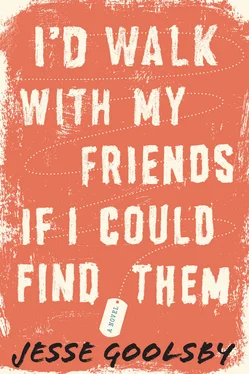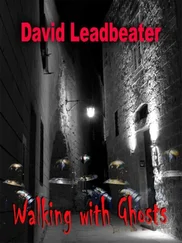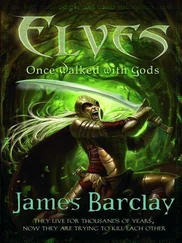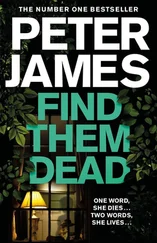No matter what comes it won’t be easy, but the girl is easier than the darkness, the smell of burning trash, a push in the back, ripping flesh. Wintric won’t close his eyes. Darkness takes him there. He attempts to focus, to stay here in the parking lot, in Chester. The tomatoes are next to him. He’ll wash them when he gets home. The steering wheel is in front of him. He grabs it. A bread truck pulls to the back of the store for delivery. Kristen is in the store working. It’s almost time for her to come home.
Wintric sits in the tenth and highest row of Chester High School’s bleachers and wonders if Daniel will throw the next pitch at the batter’s head. Since the time Daniel started Little League, Wintric has preached that he should throw a couple wild pitches each game to keep the batters nervous about where the next one might end up. This method worked well during Little League, but Daniel, now seventeen years old, with a fastball that reaches the low eighties, has the control to aim his “wild” pitches, and when appropriately pissed off, as he is today, down 4–0, the heaters come in high and tight. Just last week Daniel cracked a kid’s helmet.
The batter digs his back foot in, and Wintric senses the energy in the afternoon, unsure what to do with it. Back from rehab and clean for a month, he rubs his hands together, still acclimating to the sharp sensation of unmedicated touch. The feeling keeps him busy, his hands moving from his pockets to his hips to the back of his neck, from sitting to standing to sitting to walking, nothing ever comfortable or calm enough. The acupuncture, meditation, and aspirin do nothing for his bad back and right hip, although they have helped decrease the frequency of his devastating memories. Most of his waking hours his bones feel misplaced and heavy. The counselors told him that this was what recovery felt like, that the promise of sobriety isn’t about comfort, it’s about being present, facing the moment aware, but Wintric is convinced that awareness isn’t worth the price of pain, at least not yet. It’s not like the drugs make him blind. He could be here, at this exact spot, present but pain-free, and still watch Daniel drill this kid with the next pitch.
Wintric stands and pockets his hands.
In front of him, the outfielders shade in a bit too much for the three-hole batter from Greenville. The infield grass is mostly yellow, and along the outfield fence thin pockets of April snow melt. Several of the town’s homes still have their fireplaces going, and the smell of burning wood mixes with early pollen.
Daniel adjusts his cap low, then spits. A few inches short of six feet and thick across the shoulders, he readies himself on the mound and peers in at the catcher. His windup is slow and compact, his hands waist-high as he starts his move, rocking back, then upright, left leg rising, right arm reaching back low, then whipping forward, the baseball delivered hard and cutting inside, the batter turning just in time, turning his back toward the sting, the flat smack of a fastball to the kidneys and the collective groan of the thirty people in the stands. The batter feels the pain, arches his back, and his hands go there as he falls to his knees.
Wintric studies Daniel, who has taken two steps toward the plate. Straight-faced, he runs his pitching hand along the side of his thigh and studies the batter, who fights to hide his distress. Wintric searches for the slightest smile on his son, a glance his way in the bleachers, but Daniel stands still, now chatting with the catcher while the batter rises slowly and twists and trots down to first.
Wintric wasn’t surprised when it was Daniel who picked him up from rehab down in Sacramento. Kristen’s threat to leave had forced him to go in the first place, and the threat still retains its tangible power as he curses the aspirin bottle three times a day. She hasn’t asked a single question about his time with the counselors or what he confessed or learned in the small group sessions. All she cares about is that he’s clean, that he’ll stay clean. On the way home from Sacramento, Daniel was exuberant, and he flung questions at Wintric one after another: How was the food? Not bad, actually. What was the worst you saw? Meth — never screw with meth, son. Did you catch any Giants games on TV? God, no power in the middle of the lineup. How do you feel? Hollowed-out but happy. We going deer hunting this fall? We’ll put in for out-of-state, get us a big one.
Daniel drove and they rode 99 up through Yuba City, Gridley, and Chico, through the miles of almond orchards, before they turned northeast on 32 into the mountains. Wintric listened to his son go on and on, asking questions, then shooting off on tangents about his ex-girlfriend, about an English teacher who had it in for him, about maybe becoming a firefighter after finishing school. Wintric realized that he knew so little about his son and finally wanted to know everything. He understood then that his son had always worshipped him, and still did at seventeen, that there was no justice or redemption in that. His son didn’t know him at all — he loved the idea of a dad and not the father that Wintric had been. It was pathetic and beautiful and easy. Sitting next to Daniel, Wintric was suddenly grateful and scared that Daniel would forgive all of his future sins.
In the stands Wintric rubs his hands together and hears a logging truck downshift beyond the outfield fence. His fingertips and scalp ache, and he shakes his head at the thought of forty tiny needles pressed into the skin along his vertebrae. Will he always yearn for the drugs? Even now, watching his boy play ball? If he could only leave his body somewhere else for a couple hours and come back to this place. He fights the thought, but he knows he can get the pills a quarter mile from the bleachers where he stands. He remembers the address. He saw the guy at the gas station two days ago. He has enough money in his wallet.
From two rows down, someone from Greenville says, “The kid meant to do it. Look at him. Didn’t even say sorry.”
The mother of Chester High’s third baseman says, “Come on. It slipped,” and glances back at Wintric and grins.
One of the counselors had bright orange hair, which annoyed Wintric, but the guy, Jeff, had been to the far bottom of heroin and back up and he talked straight and cussed, so Wintric listened. Jeff took Wintric on walks down to the American River, where they’d watch the whitewater rafters and where Jeff repeated his sign-up message: “Pain isn’t a fucking choice. Neither are the flashbacks. They’re there. Comfort, happiness, all that weird shit we say when we mean ‘not in pain,’ that’s a choice. A hard choice. If you ever stop choosing it, you’re fucked. Optimists are deluded but sign up. You want in that club. Whatever it takes, sign up.”
To Wintric, Jeff’s speeches came off as too simplistic, even juvenile, but the guy was adamant and would occasionally sneak him a Lucky Strike. Wintric didn’t notice anyone else getting the American River treatment, and Jeff kept reminding Wintric that he was one of the blessed ones: a family waiting for him, not suicidal, no heroin or meth.
On the mound, Daniel wears his baseball hat low on his forehead as Wintric used to do when he was a boy playing Little League centerfield. Daniel licks his fingers and twists the baseball in his hand. The crowd has settled down, but everyone is anxious for this first pitch after the wild pitch. Was it really an accident? Has the pitcher lost control?
When Wintric returned home, Kristen told him to come to her at the supermarket and interrupt her whenever he needed help, but he holds on to the beginning of newfound pride in not having gone to her once since his return to town. If Kristen ever does ask him, he’ll tell her why he’ll never relapse. He’ll tell her about his small group sessions, how he saw the whole spectrum from lifelong fucked-up meth heads to three-drinks-a-night country-club housewives. It didn’t matter whose turn it was to speak; the stories all ended up at the same fear — being alone.
Читать дальше












